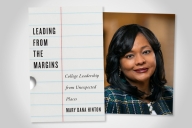You have /5 articles left.
Sign up for a free account or log in.
It’s something many graduate students have heard: “You must be very intelligent.” It’s also the title of a new novel about academic life that asks if going to grad school really is a smart choice -- or even a sane one.
Author Karin Bodewits, co-founder of NaturalScience.Careers, an advice website, started writing You Must Be Very Intelligent: The Ph.D. Delusion (Springer), between the submission and defense of her doctoral thesis (biochemistry and microbiology) in 2011, while backpacking around South America. The first scribbles of it remain in the back of her travel guidebook. While people who read the first chapters encouraged her to continue, she said, she was scared of the potential consequences. Why? Take the prologue, to start.
“When I started my Ph.D. I had been scared I wouldn’t be clever enough to become a doctor, but I did believe I had at least done enough to prepare myself for starting this degree,” Bodewits wrote in the voice of her protagonist, also named Karin, upon her graduation. “The truth is, I was clever enough but nothing had prepared me. Looking back, whilst cringing in embarrassment at my naiveté, I wonder now if I was actually unlucky to be accepted?”
Now that she has “the title,” Karin says, “What does that mean? Marginally less than a Girls Guide Camping Badge. This is what I’ve learned.”
Not exactly an endorsement of the Ph.D. experience. In fact, Bodewits’s book -- which is technically a novel but reads more like a loose memoir or exposé -- is a fairy tale in reverse, or perhaps a postmodern fairy tale: girl who has it all, or who at least has it all together, gets to fulfill her longtime dream of earning a doctorate and loses herself in the process.
A Fairy Tale in Reverse
At the start of Part 1, Karin, a Dutch native (like Bodewits), is just finishing up a cushy internship at Unilever in Shanghai but looking for more, which she thinks she’ll find in academe. So it’s off the University of Edinburgh (Bodewits’s actual Ph.D. institution) to interview for a position in a chemistry lab, doing research on cystic fibrosis. Bodewits is a biologist, not a chemist, and she’s not necessarily attached to the cause. But in her field, she says, it’s all about the tiny details anyway, and the big picture here is enough to “avoid social isolation at parties.” Most importantly, she says, the assignment means potentially contributing to “fundamental knowledge that might find a future application.”
Still, there are signs that the assistantship won’t be all she’s imagined academe to be: there’s the student on the way to the interview who tells her that her adviser, Mark McLean, is “not the easiest to work for.” The lab seems surprisingly spare for so an esteemed an institution -- it doesn’t even have its own projector. And Mark seems surprisingly uninterested in, well, anything Karin has to say. He also offers her the position on the spot (she later learns there are no other applicants).
But that’s all in retrospect, of course. Plus, Karin is fighting a hangover -- one of many she’ll have throughout the book -- and possibly a mysterious Asian virus at the time of her interview. So she accepts.
It’s all uphill -- or, rather, downhill -- from there. “Not the easiest to work for” turns out to be a gentle term for Mark, whose mercurial personality and general megalomania make for a less-than-pleasant lab environment. His moods rise and fall with the success of his favorite soccer team and he can’t, for example, understand why people won’t work for free when funding runs out. He’s also the kind of person who would force a biologist -- say, Karin -- to teach a second-year undergraduate chemistry class, just because he can. Mark isn’t all: there’s the chilly lab climate in general and, in particular, the postdoc who tells Karin to make him first author on a paper he had nothing to do with, or else (the “else” being a threat to rupture her relationship with Mark further, which Karin quickly decides isn’t possible).
There is academic backstabbing, commonplace research theft and equally common refusals to share data for the greater good. There are also other strange characters on campus, including a creaky old professor who asks Karin for sex and a highly attractive one who, curiously, doesn’t. There’s Karin’s realization that she probably won’t ever work as an academic for some of the aforementioned reasons, among others. And there’s the loyal boyfriend who follows her to Edinburgh -- and their inevitable relationship demise (no spoiler here -- Bodewits reveals that outcome early on).
Whistling Past the Graveyard
On the surface, Bodewits’s tale should probably be classified as horror, or at least drama. Yet it’s her descriptions and outlook that make the novel more humorous than anything else. Gallows humor, but humor nonetheless. A shoddy mattress and box spring in university accommodations, for example, appear as if “two sumo wrestlers [have had] torrid sex,” on them, and a landlady looks like “Marilyn Manson dressed up as a nun.” And Karin’s response to the professor who asked her for sex and then declared he had nothing to lose? “What about dignity?”
There are friends and good times -- if not in her own lab; indeed, when Karin wins a prize to attend a conference in Canada, it’s scientists in another lab she tells, not her immediate colleagues. Oh, about that conference -- it’s juicy, and we’re not talking about the science.
There’s also the drinking. A lot of it -- teetotalers beware.
If You Must Be Very Intelligent is a tragicomedy, Karin is not a tragic heroine. She digs in her heels, publishes articles and earns her degree. She’s disillusioned, but she’s also breaking the spell that academic life has had on her since she was a child growing up in what Bodewits calls “the economically dead” northeastern Netherlands. In so doing, she’s opening her future up to new opportunities -- and collecting priceless material for a story along the way.
Bodewits has written several books, including a career guide for female scientists, but You Must Be Very Intelligent is her first novel. In addition to books and her business, Bodewits speaks about “soft skills” at seminars for junior scientists and writes columns about science as well as short stories. She lives in Munich with her partner and two sons.
Asked how she thought the fictional Karin’s experiences aligned with those of graduate students in the U.S. Bodewits said recently that the main aspects were the same, namely, “the competitive international academic system, as well as a huge power distance between [principal investigator] and graduate student -- and a strong dependency as students have to finish their degree.” And in the U.S., she added, Ph.D.s tend to take even longer than those in Europe, which could “aggravate” the situation. (Indeed, Karin is finished within four years -- quick by American timelines, even in the natural sciences, which tend to be quicker than the social sciences and humanities.)
“I think the experience I describe is not unusual,” Bodewits added. “Many graduate students go through this phase of disillusion at some point, at least when it comes to the general aspects of how modern science is run. The relationships to the supervisors vary from excellent to even more disastrous than described in the book.”
Indeed, Bodewits said that Karin is in a sense “lucky.” Her confidence is plummeting, but she also meets “many hilarious personalities in the ivory tower. Those characters make the heroine feel like sitting in a slapdash sitcom set and make her smile every single day," Bodewits said. "She meets good, beautiful, intelligent lecturers and professors who fight for her rights. People with the door wide-open. People other Ph.D. students in similar situations might not meet.”









